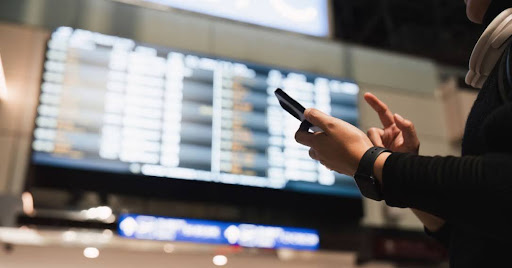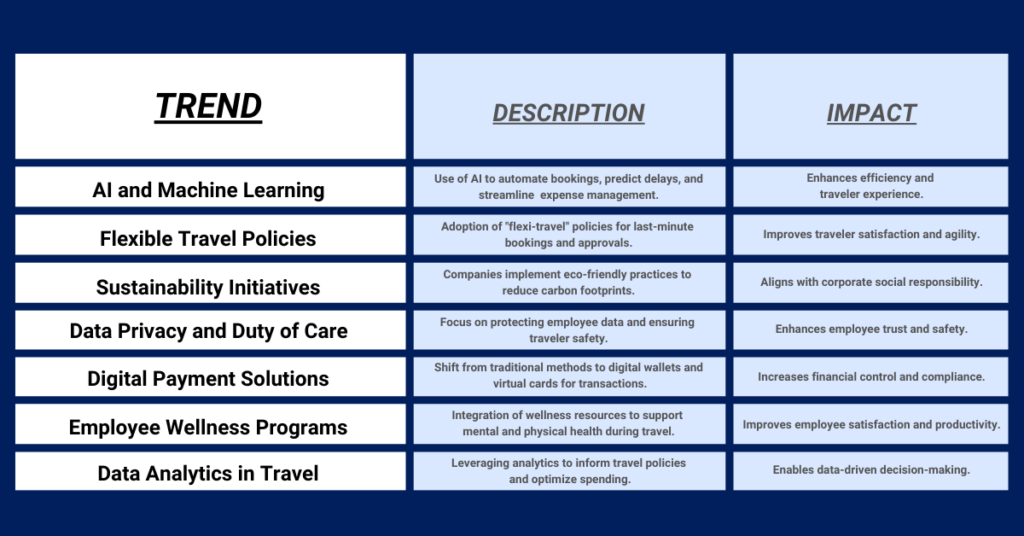
“The best way to predict the future is to create it.” — Peter Drucker
The future of B2B travel is bright, shaped by a blend of evolving trends driven by technological advancements, shifts in corporate culture, and sustainability goals. In 2024, the business travel landscape will transform as companies seek more efficient, flexible, and sustainable options.
According to reports, the global business travel industry generated around $933 billion, representing a 34% increase in revenue in 2023, with growth expected to continue through 2024. As organizations look ahead, embracing these changes will be key to staying competitive in the B2B travel market.
Another pivotal shift is using AI and machine learning in corporate travel planning. These technologies enhance trip management by offering real-time solutions for flight changes, expense tracking, and risk management. According to recent industry reports, 60% of companies already use AI to streamline corporate travel, resulting in cost savings and improved traveler experiences.
Additionally, data privacy and duty of care have become crucial in B2B travel management. With the rise in cyber threats, around 66% to 76% of companies now prioritize data security during corporate travel planning, ensuring employee information remains protected throughout their journey.
The rise of sustainability in the corporate world also shapes the future of B2B travel. Companies are adopting more eco-friendly travel practices to reduce their carbon footprint. By 2030, 50% of businesses will set emission reduction targets for corporate travel. This shift toward green travel is a vital part of future trends in B2B travel, as environmental responsibility becomes a corporate priority.
Evolution of Business Travel Policies
Business travel policies are evolving to reflect the changing dynamics of work. The shift to remote work, hybrid work models, and increased flexibility have led companies to rethink their approach to travel. Companies are adopting more flexible travel policies, allowing cost-efficient, last-minute bookings, and remote travel approvals. This flexibility is critical for organizations seeking to stay agile in the competitive B2B travel industry.
As part of these changes, trends in B2B travel include the rise of “flexi-travel” policies. These policies allow employees to book travel conveniently while ensuring compliance with the company’s travel guidelines. This shift improves traveler satisfaction and streamlines administrative processes.
5 Key Evolving Trends
- Flexibility in Travel Arrangements: Companies adopt flexible policies for last-minute bookings and travel approvals to adapt to changing business needs.
- Increased Use of Technology: Travel management tools streamline booking and expense tracking processes, making travel easier and more efficient.
- Focus on Employee Well-being: Organizations prioritizing mental health and work-life balance during travel enhance the travel experience.
- Sustainability Initiatives: Businesses encourage eco-friendly travel options and partner with sustainable suppliers to reduce their environmental impact.
- Data-Driven Decision Making: Companies leverage data analytics to inform travel policies, optimize spending, and enhance traveler experiences.
Understanding Key Trends in B2B BusinessTravel
Understanding the trends in B2B business travel is essential for organizations aiming to thrive in this evolving landscape. Key factors influencing these trends include the integration of technology, changing employee expectations, and the increasing importance of sustainability. Companies must recognize that technology, particularly AI and machine learning, is reshaping how travel is managed, enhancing efficiency, and improving traveler experiences.
Moreover, as employees seek more flexible travel options, organizations must adapt their travel policies to reflect this shift. The focus on sustainable practices signifies a broader cultural change within corporations, where environmental responsibility is becoming integral to business strategy.
Calculate your savings now!
The Role of AI and Machine Learning in B2B Travel
Artificial intelligence and machine learning are not just buzzwords; they are transforming B2B travel in fundamental ways. From automating bookings to personalizing travel itineraries, AI-driven tools are making it easier for businesses to manage their travel needs efficiently. By 2024, more companies are expected to adopt these technologies, further streamlining processes and reducing operational costs.
AI helps predict flight delays, suggest alternative routes, and offer real-time notifications, ensuring travelers stay on schedule. Additionally, AI-powered expense management tools simplify cost tracking, ensuring compliance with company policies. With 60% of businesses already using AI for corporate travel, this technology is set to be a defining trend in the future of B2B travel.
Artificial intelligence (AI) and machine learning are transforming B2B travel in various ways:
- AI Chatbots: Provide 24/7 assistance for booking, itinerary management, and customer support.
- Flight Disruption Management: AI predicts delays and suggests alternative routes.
- Smart Expense Reporting: AI tools automatically track and categorize expenses, ensuring company policy compliance.
- Real-Time Travel Alerts: AI provides live updates on flight status and travel disruptions, helping travelers stay informed.
As AI adoption increases, more companies will leverage these technologies by 2024 to optimize travel management.

Prioritizing Data Privacy and Employee Duty of Care in Business Travel
As the volume of business travel increases, so does the importance of data privacy and duty of care. Ensuring the safety and well-being of employees during business trips is now a top priority for organizations. Seventy-four percent of companies have made data privacy and security a core part of their travel management strategies. Protecting sensitive employee information and mitigating cyber threats during travel is integral to future trends in B2B travel.
Duty of care extends beyond safety and privacy. Companies now focus on traveler well-being, offering support and resources for employees to manage travel-related stress. These initiatives protect employees and enhance their overall experience, leading to more productive business trips.
Key Considerations for Data Privacy and Duty of Care
- Enhanced Data Security Measures: Companies implement more robust security protocols to protect employee data from breaches and cyber threats during travel.
- Real-time Monitoring of Traveler Safety: Organizations utilize technology to track employee locations and ensure their safety throughout the trip.
- Comprehensive Emergency Support: Businesses provide resources and support for travelers in emergencies, ensuring they have access to necessary assistance.
- Regular Training on Data Privacy: Companies are conducting training sessions to educate employees on data privacy best practices during travel.
- Focus on Mental Health Resources: Organizations prioritize mental health support, offering resources for employees to manage stress and maintain well-being during trips.
Sustainability and Corporate Travel
Sustainability is more than just a buzzword; it is becoming a crucial component of B2B travel strategies. As companies aim to reduce their carbon footprints, sustainable travel practices are gaining prominence. Many organizations are adopting green policies, reducing air travel emissions, encouraging rail travel, and selecting eco-friendly accommodations. With 50% of companies setting targets for emission reduction by 2030, sustainability will continue to be a core focus in the evolution of B2B travel.
By incorporating sustainability into their travel strategies, companies meet their corporate social responsibility goals and appeal to environmentally conscious clients and stakeholders.
The Importance of Adaptability and Strategic Planning
To navigate the rapidly evolving landscape of B2B travel, companies must prioritize adaptability and strategic planning. As technological advancements and sustainability goals continue to reshape business travel, organizations that remain agile and proactive in adopting new trends will be better positioned to thrive in the competitive B2B travel space.
Adaptability involves recognizing and responding to changes in employee expectations, technology, and industry regulations. Companies must be willing to modify their travel policies and practices to accommodate evolving needs. This could mean integrating new tools, adjusting travel budgets, or enhancing support for travelers.
Strategic planning ensures that organizations can effectively implement changes while aligning travel goals with broader business objectives. This includes conducting regular reviews of travel programs, analyzing data to identify trends, and collaborating with travel partners to enhance offerings.
The Rise of Remote Work and Its Impact on B2B Travel
The COVID-19 pandemic has permanently altered how businesses operate, with many companies embracing remote work as a standard practice. This shift has profound implications for B2B travel. As more employees work remotely, the nature of business trips is changing. Companies are increasingly allowing employees to combine business travel with personal time, leading to the rise of “bleisure” travel.
The Future of Payment Solutions in B2B Travel
Another significant trend in B2B travel is the evolution of payment solutions. Traditional payment methods are increasingly replaced by innovative solutions that streamline transactions and improve financial management. Digital wallets, virtual cards, and blockchain technology are gaining traction, offering enhanced security and transparency in travel-related payments.
These new payment methods give businesses greater control over their travel expenses, reduce the risk of fraud, and ensure compliance with travel policies. As companies continue to adopt these solutions, we can expect a more efficient and secure financial landscape in the B2B travel sector.
Integrating Employee Wellness Programs
Employee well-being is emerging as a critical component of B2B travel strategies. Companies recognize the importance of supporting their employees’ mental and physical health during business trips. Integrating wellness programs into corporate travel policies can improve employee satisfaction and productivity.
Travel-related stress can impact an employee’s performance and overall experience. Therefore, organizations now offer resources such as access to wellness apps, fitness memberships, and mental health support during travel. By prioritizing employee well-being, companies can create a more positive travel experience and foster a culture of care.
The Importance of Data Analytics in B2B Travel
Data analytics is playing an increasingly crucial role in shaping B2B travel strategies. By leveraging data-driven insights, companies can make informed decisions about travel policies, vendor partnerships, and budget allocation. Analyzing travel patterns, spending habits, and employee preferences allows organizations to optimize their travel programs effectively.
Moreover, data analytics can help identify areas for cost savings, enabling companies to negotiate better rates with suppliers and improve their overall travel spend management. As the B2B travel landscape evolves, organizations harnessing data analytics’ power will gain a competitive edge.
Embracing Change for a Sustainable Future
In conclusion, the future of B2B travel is characterized by adaptability, innovation, and a commitment to sustainability. Companies must embrace emerging technologies, rethink travel policies, and prioritize employee well-being to navigate the evolving landscape successfully. As trends in B2B travel continue to unfold, organizations that are proactive in their approach will be best positioned to thrive in this competitive industry.
By staying ahead of the curve and embracing the trends shaping B2B travel, businesses can enhance their travel programs, improve employee satisfaction, and contribute to a more sustainable future. As we move into 2024 and beyond, the potential for growth and innovation in B2B travel remains vast. Companies that recognize and adapt to these changes will lead the way in the evolving travel landscape.






